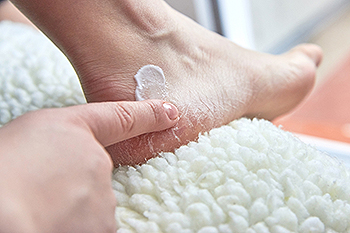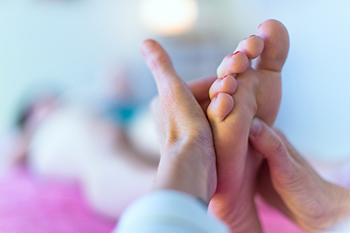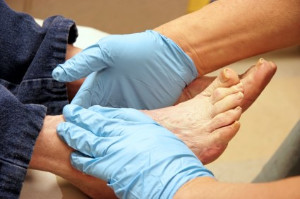Items filtered by date: December 2023
Understanding Arthritis-Induced Toe Pain

Arthritis, a condition characterized by inflammation and stiffness of the joints, can affect various parts of the body, including the toes. When arthritis strikes the toes, it can lead to persistent and often debilitating pain. The most common forms of arthritis that affect the toes are osteoarthritis and rheumatoid arthritis. Osteoarthritis, often associated with aging and wear and tear, causes the cartilage in the toe joints to break down, resulting in pain, swelling, and reduced mobility. Conversely, rheumatoid arthritis is an autoimmune disease that attacks the joints, leading to inflammation, pain, and deformities in the toes. This type of toe pain can be particularly challenging, as we rely on our toes for balance and mobility. It can affect daily activities such as walking, standing, and even wearing shoes comfortably. Understanding the nature of this pain is the first step toward finding relief and maintaining a good quality of life. If you have toe pain, it is strongly suggested that you are under the care of a podiatrist who can diagnose toe arthritis, and offer appropriate management options.
Toe pain can disrupt your daily activities. If you have any concerns, contact Dr. Douglas Mckay of New Jersey . Our doctor can provide the care you need to keep you pain-free and on your feet.
What Causes Toe Pain?
Most severe toe pain is caused due to a sports injury, trauma from dropping something heavy on the toe, or bumping into something rigid. Other problems can develop over time for various reasons.
Toe pain can be caused by one or more ailments. The most common include:
- Trauma
- Sports injury
- Wearing shoes that are too tight
- Arthritis
- Gout
- Corns and calluses
- Hammertoe
- Bunions
- Blisters
- Ingrown toenails
- Sprains
- Fractures (broken bones)
- Dislocations
When to See a Podiatrist
- Severe pain
- Persistent pain that lasts more than a week
- Signs of infection
- Continued swelling
- Pain that prevents walking
Diagnosis
In many cases the cause of toe pain is obvious, but in others, a podiatrist may want to use more advanced methods to determine the problem. These can range from simple visual inspections and sensation tests to X-rays and MRI scans. Prior medical history, family medical history, and any recent physical traumatic events will all be taken into consideration for a proper diagnosis.
Treatment
Treatments for toe pain and injuries vary and may include shoe inserts, padding, taping, medicines, injections, and in some cases, surgery. If you believe that you have broken a toe, please see a podiatrist as soon as possible.
If you have any questions please feel free to contact one of our offices located in Caldwell, and Galloway, NJ . We offer the newest diagnostic tools and technology to treat your foot and ankle needs.
A Closer Look at Causes of Cracked Heels

Cracked heels, a common foot ailment, manifest as fissures or splits in the skin around the heel area. The primary cause of this condition lies in the lack of moisture, leading to dry and hardened skin. Prolonged standing or walking on hard surfaces can exacerbate the problem, as the pressure on the feet intensifies. Obesity is another contributing factor, as excess weight puts additional strain on the feet, fostering the development of cracks. In some cases, underlying medical conditions such as diabetes or hypothyroidism may contribute to the dryness of the skin, increasing the risk of cracked heels. Lack of proper foot care, including infrequent moisturizing and neglecting to exfoliate dead skin, further amplifies the susceptibility to cracked heels. Understanding these causes is pivotal for adopting preventive measures and a comprehensive foot care routine, ensuring the maintenance of soft, healthy heels. If you have developed cracked heels, it is suggested that you visit a podiatrist who can offer you correct treatment and prevention techniques.
Cracked heels are unsightly and can cause further damage to your shoes and feet. If you have any concerns, contact Dr. Douglas Mckay from New Jersey . Our doctor can provide the care you need to keep you pain-free and on your feet.
Cracked Heels
Cracked heels appear unappealing and can make it harder for you walk around in sandals. Aside from looking unpleasant, cracked heels can also tear stockings, socks, and wear out your shoes. There are several methods to help restore a cracked heel and prevent further damage.
How Do You Get Them?
Dry skin is the number one culprit in creating cracked heels. Many athletes, walkers, joggers, and even swimmers suffer from cracked heels. Age and skin oil production play a role to getting cracked heels as well.
Promote Healing
Over the counter medicines can help, especially for those that need instant relief or who suffer from chronic dry feet.
Wear Socks – Wearing socks with medicated creams helps lock in moisture.
Moisturizers – Applying both day and night will help alleviate dryness which causes cracking.
Pumice Stones – These exfoliate and remove dead skin, which allows for smoother moisturizer application and better absorption into the skin.
Change in Diet
Eating healthy with a well-balanced diet will give the skin a fresh and radiant look. Your body responds to the kinds of food you ingest. Omega-3 fatty acids and zinc supplements can also revitalize skin tissue.
Most importantly, seek professional help if unsure how to proceed in treating cracked heels. A podiatrist will help you with any questions or information needed.
If you have any questions, please feel free to contact one of our offices located in Caldwell, and Galloway, NJ . We offer the newest diagnostic and treatment technologies for all your foot care needs.
Podiatric Foot Therapy

Podiatrists offer a variety of foot therapies and treatments to address various foot and ankle conditions. They conduct comprehensive foot and ankle examinations to diagnose problems and provide pain management solutions for conditions like plantar fasciitis, Achilles tendonitis, and arthritis. Podiatrists may prescribe custom-made orthotic devices to correct issues such as arch support and gait abnormalities. Surgical procedures are performed when necessary, including treatments for bunions, hammertoes, and fractures, in addition to Ingrown toenail removal, wound care, and fungal infections. They provide casting, bracing, and splinting for fractures and deformities. Footwear recommendations, treatment for skin conditions like corns and calluses, and pediatric foot care are all part of the services they offer. Furthermore, podiatrists emphasize preventive care, guiding patients in maintaining overall foot health through proper routines and measures. If you have a foot or ankle issue, it is suggested that you schedule an appointment with a podiatrist for guidance on the proper foot therapies for you.
Foot therapy is often necessary for those recovering from either foot deformities or foot injuries. If you have concerns regarding therapy, consult with Dr. Douglas Mckay from New Jersey . Our doctor can provide the care you need to keep you pain-free and on your feet.
Most Common Injuries
People who are active or athletes are prone to a variety of injuries. Therefore, it is often important to take part in physical therapy in order to quickly get back on the right track.
What to Do When Injured
Physical Therapy – This specialized treatment will focus on the affected area, speeding up recovery and the overall healing process. It is a proven method that has helped millions of people return from any injury.
During physical therapy you will undergo regimented training to get back into full form. Training is often very difficult, especially at first when the foot feels weak. Physical therapy often involves:
Basic stretching and twisting exercises – getting the feet’s mobility and flexibility up.
Massaging – the therapist will massage the injured area in order to activate the muscles and relax them.
Strengthening Exercises – this allows the muscles in the affected area to regain their full strength, a vital step towards full recovery.
If you have any questions please feel free to contact one of our offices located in Caldwell, and Galloway, NJ . We offer the newest diagnostic tools and technology to treat your foot and ankle needs.
Symptoms of Diabetic Feet

Diabetic feet, a manifestation of diabetes-related complications, exhibit distinctive symptoms that demand attention and care. One prevalent sign is peripheral neuropathy, causing tingling or numbness in the feet due to nerve damage. Loss of sensation may lead to difficulty detecting injuries or changes in temperature. Skin changes, such as dryness, cracking, or peeling, are common, while slow healing wounds and ulcers may develop, posing a risk of infection. Changes in foot shape or deformities, including hammertoes, can arise as a result of altered biomechanics. Poor circulation in diabetic individuals may lead to cold feet, color changes, and a weakened pulse. Recognizing these symptoms is vital, as diabetic feet require meticulous care to prevent complications like infections and amputations. Regular foot examinations, proper hygiene, wearing well-fitting footwear, and blood sugar control are paramount for preserving foot health in individuals with diabetes. If you have diabetes, it is strongly suggested that you are under the care of a podiatrist who can help you to manage this serious condition.
Diabetic foot care is important in preventing foot ailments such as ulcers. If you are suffering from diabetes or have any other concerns about your feet, contact Dr. Douglas Mckay from New Jersey . Our doctor can provide the care you need to keep you pain-free and on your feet.
Diabetic Foot Care
Diabetes affects millions of people every year. The condition can damage blood vessels in many parts of the body, especially the feet. Because of this, taking care of your feet is essential if you have diabetes, and having a podiatrist help monitor your foot health is highly recommended.
The Importance of Caring for Your Feet
- Routinely inspect your feet for bruises or sores.
- Wear socks that fit your feet comfortably.
- Wear comfortable shoes that provide adequate support.
Patients with diabetes should have their doctor monitor their blood levels, as blood sugar levels play such a huge role in diabetic care. Monitoring these levels on a regular basis is highly advised.
It is always best to inform your healthcare professional of any concerns you may have regarding your feet, especially for diabetic patients. Early treatment and routine foot examinations are keys to maintaining proper health, especially because severe complications can arise if proper treatment is not applied.
If you have any questions please feel free to contact one of our offices located in Caldwell, and Galloway, NJ . We offer the newest diagnostic and treatment technologies for all your foot and ankle needs.



